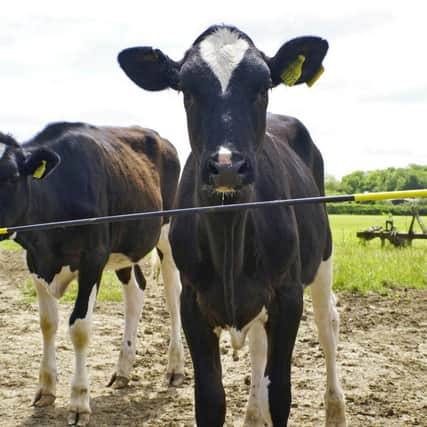Batteries add to threat of lead poisoning in cattle


Statistics released this week by Food Standards Scotland (FSS) show that over 400 animals have been restricted from the food chain due to lead poisoning since 2019.
While such losses remain relatively rare, the costs are total with no outlet for animals either dying or suffering from the complaint.
Advertisement
Hide AdAdvertisement
Hide AdAnd FSS has launched its 2022 campaign to support producers and encourage them to proactively remove potential sources of poisoning, building on the success of last year’s activity.
Stuart McAdam, head of incidents at FSS, said that lead poisonings could have a devastating impact and could put consumers at risk.
“Lead is a highly toxic metal which can cause slow or stunted growth, blindness, infertility, birth defects and death.
"Not only are the health impacts on livestock distressing, but there are financial implications such as veterinary fees, carcass disposal and loss of market value.
“Contaminated meat, offal and milk containing lead at levels above legal limits is unsafe and illegal to sell.
"In addition, there is a minimum 16-week withdrawal period which can cause delays across the supply chain and incur costs for testing,” he warned
He said that it was recognised that farmers were serious about the health and welfare of the animals in their care.
But, due to the fact that incidents of lead poisoning often peaked in spring when cattle are put out to pasture – often coming across a winter’s worth of fly-tipping - yhat had been the driver behind the launch of the on-farm incident prevention campaign.
Advertisement
Hide AdAdvertisement
Hide Ad“Lead batteries, old paint, bonfire ash and fly-tipping are the primary causes of lead poisonings,” said McAdam.
“Prevention is the best strategy and checking fields regularly and removing animals’ access to these sources are the first steps.”
Farmer Steven Barron, of Findowrie Farm in Angus, discovered first hand just how distressing on-farm incidents like lead poisoning could be.
“It happened during the first lockdown and we were down to our last seven calves to be born.
"I remember enjoying watching the rest out in the field as it was a beautiful sunny day, but the next day I was shocked to find some of the cattle had died.”
In total, Barron lost eight cattle due to lead poisoning, with two batteries found in the field which had been dumped by fly-tippers.
“I’m really cautious about using batteries now for electric fences. When using them, we ensure that the battery and fencer are covered or located out of reach of cattle.
“Disposal of old batteries is also very important and we ensure there are no redundant batteries left on our farm.
"I wouldn’t want anyone else to experience what we did and I urge all farmers to familiarise themselves with the advice and campaign that FSS is running.”
Comments
Want to join the conversation? Please or to comment on this article.